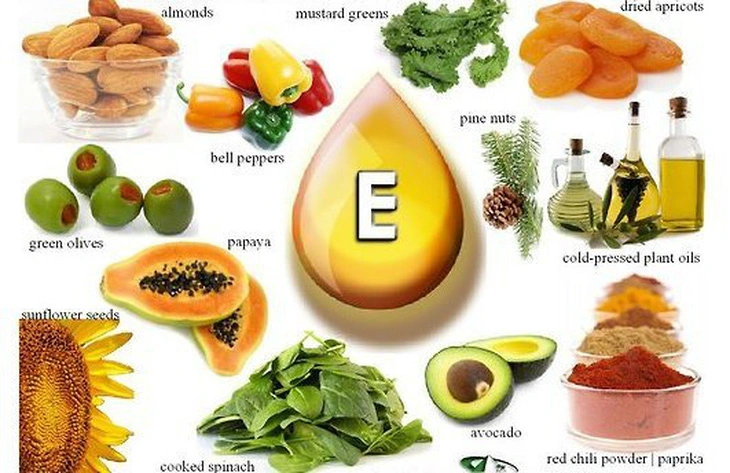This vitamin is essential for normal functioning of the reproductive organs of both men and women and better sperm development, improving the results of infertility treatment.

Foods rich in vitamin E
Vitamin E plays an important role as a vasodilator and anticoagulant. Every 200 units of E with 25mcg of selenium will increase the intensity of vitamin E. Keep the body looking younger by slowing down the aging process, preventing the oxidation of “bad” cholesterol, providing oxygen to the body.
Vitamin E deficiency can cause neurological disorders and infertility.
- Vitamin E is a general name for a group of natural and synthetic compounds that are isomers of each other, which have the effect of preventing oxidation of essential components in cells, protecting cell membranes from attacks by free radicals.
- Vitamin E is mainly found in vegetable oils such as peanut oil, olive oil. In animals, there is very little vitamin E, only mainly in the liver. The characteristic of this vitamin is that it is in the form of a viscous liquid, odorless, insoluble in water.
- Vitamin E is soluble in oil and organic solvents, easily decomposed by oxidants and light. On the market, there are many types of vitamin dosage forms, mainly single-ingredient soft capsules (containing only vitamin E), or combined with vitamin A or vitamin C to be used as an antioxidant.
- Vitamin E is indicated for the treatment of skin disorders, supportive treatment of fatty liver, hypercholesterolemia, supportive treatment of infertility, and decreased sperm production in men.
- Vitamin E is a vitamin that is very soluble in fat, existing in the form of a golden or pale yellow oil. There are two types of vitamin E: natural and synthetic.
- Natural vitamin E is extracted from vegetable oils such as soybeans, corn, barley germ, oil seeds such as sunflower seeds, etc., while synthetic vitamin E is prepared using chemical technology.
In terms of absorption and use, the two types of natural and synthetic vitamin E in the body are no different, but the natural vitamin is used about 50% more than the synthetic type.
The effect of synthetic vitamin E is lower than that of the natural type. Therefore, if you eat a reasonable diet with enough nutrients, eat a lot of fruits and vegetable oils, you will not be afraid of vitamin E deficiency.
Eating foods rich in vitamin E helps eggs and sperm develop well.
The main effect of vitamin E is as an antioxidant. It participates in the metabolism of nucleic acids, creates connective tissues, protects the circulatory system, and protects the integrity of cell membranes, especially red blood cells.
This vitamin is essential for the normal functioning of the reproductive organs of both men and women. For pregnant women, vitamin E contributes to the favorable pregnancy process, fetal development, and reduces the rate of miscarriage or premature birth by neutralizing or inactivating free radicals in the body.
Vitamin E also relieves symptoms of cramps, muscle pain or menstrual cramps in teenage girls. Girls who take vitamin E from the beginning of their period will reduce menstrual pain by 36%.
In addition, vitamin E also contributes to improving sex, helping eggs and sperm develop better, improving the results of infertility treatment. Vitamin E can help slow down the aging process of skin and hair, improve dry skin, hair loss…
In general, the use of vitamin E is quite safe. Excess amounts that are not used will be quickly eliminated from the body. The average daily dose required for the body is about 100 – 400 units. Vitamin E has almost no side effects when used at normal doses.
However, when abusing vitamin E, taking too high a dose can cause nausea, stomach irritation or diarrhea, dizziness, cracked tongue or laryngitis. These symptoms will quickly disappear after stopping the drug.
The daily requirement of adults is 8-10 IU (1 IU = 1 mg), 60-70% of the daily dose is excreted in the stool. Unlike other fat-soluble vitamins, vitamin E is only retained in the body for a relatively short time, like vitamins B and C, and overdose does not cause excess.
The best way to supplement vitamin E is to use foods containing vitamin E of natural origin that are high in fat such as soybeans, bean sprouts, sesame, peanuts, barley sprouts, sunflower seeds, olive oil, etc.
In case of vitamin E deficiency or pregnant women, supportive treatment of other diseases should be consulted and instructed by doctors on the use of vitamin E.
Do not use high doses of vitamin E (3,000 – 3,200mg/day) because it can cause digestive disorders.
Be careful to store the medicine in a cool place and avoid light because vitamin E is very susceptible to changes in activity in the hot and humid conditions of our country.





